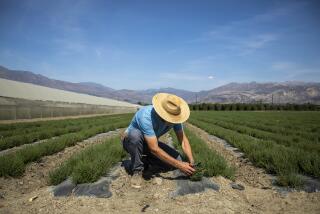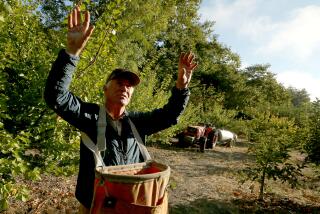Washington Apple Study Finds Organic Growing Is Best
- Share via
A six-year study comparing different types of apple production found that organic growing techniques are more profitable and produce better-tasting fruit than conventional farming methods.
The study by researchers at Washington State University, published today in the journal Nature, comes at a time when apple growers are desperate for an advantage. Washington state tree fruit specialists say they expect as many as 20% of the state’s apple farms to fail in the next 18 months.
Headed by soil scientist John Reganold, the research project planted Golden Delicious apples on four acres loaned by a 50-acre commercial farm in the state’s Yakima Valley apple district. Each growing system was tested in four different plots, laid out in a random fashion.
In the organic system, a style of farming practiced by 3% of Washington growers, no synthetic chemicals were allowed. In the organic research plots, trees were fertilized with composted manure and organic matter. Weeds were controlled with mulch. Buds were thinned by hand, not defoliants.
The conventional system, employed by at least 60% of the state’s apple farmers, used synthetic nitrogen fertilizers, herbicides, pesticides and chemical defoliants.
The “integrated” system, used by about 35% of Washington apple farmers, involved compost and synthetic fertilizers. Weed control was done with herbicides and bark mulch. Toxic chemicals were used to eradicate pests.
The researchers used a scoring system to gauge soil quality, yield, costs and apple sweetness and texture, as well as size and appearance. Prices posted by commercial growers were used to calculate market values of the crops.
“Our results,” said Reganold, “show that organic and integrated apple production systems in Washington State are not only better for soil and the environment than their conventional counterpart, but have comparable yields and, for the organic system, higher profits and greater energy efficiency.”
Moreover, a panel of tasters found the organic apples to be sweeter.
The study notwithstanding, Tim Smith, a tree fruit extension officer based in the university’s Wenatchee office, doubts the organic movement’s claims of better fruit. He also worries that farmers will overreact to the study. Smith, who has counseled tree fruit growers in the state for 26 years, pointed out that the largest organic pear supplier in the state just went bust. “It’s just an illustration that being organic doesn’t mean you’re rolling in the dough.”
Washington State horticulture professor Kathleen Willemsen said she found the study highly credible but, like Smith, worries that a switch to organic methods would not necessarily revive the apple industry. Washington apple farmers are particularly vulnerable now, she said. What used to be a billion-dollar industry is now generating about $750 million. The state’s more than 6,000 farms have dwindled to 4,500, with 900 more failures anticipated.
The problems faced by farmers, according to Willemsen and Smith, include an influx of fruit from the southern hemisphere, the fall of the Asian economy in 1996, and a domestic market controlled by a small group of supermarkets.
“People don’t know that the apples that they buy for $1 a pound were purchased for 15 cents a pound and that the grower got 6 cents a pound,” Smith said.
But Reganold’s study projects a brighter financial future for organic farmers. In two models involving different weather conditions and blemished and unblemished apples, organic orchards reached break-even points two to six years faster than those with integrated harvests, and three to eight years faster than conventional ones.
Both sets of calculations were done on the assumption that organic apples will retain their current 50% price premium.
The projections sound reasonable to at least one Yakima Valley organic apple farmer. Archie den Hoed, who did not participate in the study, began conversion of his 71-acre farm to organic three years ago. Even as the market has fallen, den Hoed said, he expects to make 50% more than he did with his conventional apples.
Reganold stressed that if society factored in the environmental costs of conventional farming, the benefits of organic would be even more dramatic. Washington apple farmers spray their crops one to four times a season with organo-phosphate pesticides, which also kill beneficial insects and are difficult for crop workers to handle safely.
But extension officer Smith doesn’t want to see his clients even think about giving up what might be a crop-saver. “You can’t get rid of your last effective tool for control of your key pest without replacing it,” he said.
For Reganold, the key to a better apple is improved soil. He estimated that of 170,000 acres devoted to apple orchards, almost all of the soil is malnourished. It is fed with chemical nitrogen fertilizers rather than with what Reganold regards as wholesome organic amendments of green matter and composted manure.
“In the last 15 years, I have been on 150-200 organic farms,” he said, “and on about the same number of conventional farms. At every organic farm, the farmer has always shown me the soil. They always say, ‘Look at the earthworms and look at the structure.’ They are thinking the soil is part of the system. I have never been shown soil by a conventional farmer.”
His report describes organic farming as having “a profound impact on soil quality, enhancing soil structure and fertility and increasing water infiltration and storage.”
This, said Andy Dolph, the farmer who managed the test plots for Reganold, is what accounted for the better-tasting, sweeter and firmer apple reported in the Nature study.
“Because the trees are in a more nutrient-rich soil, an evenly balanced soil, they impart that to the apples,” he said. The cell structure and sweetness of organic fruit is better than fast growth resulting from fertilizer, he said, adding that organic fruit stores better, too.






